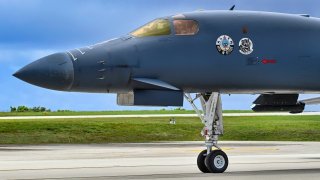Can Kamala Harris Avoid War with North Korea?
Peace on the Korean Peninsula is more precarious than in decades. Heading off the risk of war will require President Harris to change current U.S. policy.
A Looming Danger for a Potential President Harris: A War with North Korea: Peace on the Korean Peninsula is more precarious than in decades. Heading off the risk of war will require President Harris to change current U.S. policy.
The Biden Administration’s attempt to pressure Pyongyang with economic sanctions and political isolation while eschewing diplomatic engagement, far from slowing its impetus to develop nuclear weapons and the missiles to deliver them, has instead urged the Hermit Kingdom to accelerate its arming.
Worse yet, this flawed policy has prompted Kim Jong Un to give up the Kim dynasty’s three-decade drive to hedge against China’s rise by normalizing U.S. and South Korean relations. Instead, he has reverted to the North’s Cold War strategy of playing off Russia against China to preserve some freedom of action.
A Dangerous Time on the Korean Peninsula
Pyongyang has broken off all diplomatic contact with Washington and Seoul. Meanwhile, the guardrails negotiated between the North and South, barring “all live-fire artillery drills and field training exercises at the regiment level and above within five kilometers” of the Military Demarcation Line (MDL) separating the two sides, prohibiting “all live-fire and maritime maneuver exercises” near the contested waters of the East Sea, imposing “no-fly zones” in the vicinity of the MDL, establishing hotlines to forestall any accidental military clash, providing for a “maritime peace zone” in the West Sea “to prevent accidental military clashes and ensure safe fishing activities,” committing the sides to “completely withdraw all guard posts within the Demilitarized Zone (DMZ),” and demilitarizing the “Joint Security Area in Panmunjom”—having been whittled away by both sides’ violations, are now defunct.
Most dangerous of all, the very steps that both North and South Korea are taking to bolster deterrence, increased arming, stepped up-tempo and size of military exercises, and threatening rhetoric, have increased the likelihood of deadly clashes that could quickly escalate to war.
Deterrence alone will not suffice to forestall war in Korea. Reassurance is also needed. And it is not enough to reassure U.S. allies. It is also essential to reassure North Korea.
Getting the North and South to back away from the brink will be easier with engagement by Washington and Beijing.
The North’s new strategy also worries Chinese leadership. Preoccupied with its domestic concerns, Beijing does not want trouble on its borders. Addressing the Munich Security Conference on February 17, 2024, Foreign Minister Wang Yi said, “Now the most pressing task is to prevent a vicious cycle, address relevant parties’ reasonable security concerns, and de-escalate and stabilize the situation.” Beijing also showed resentment at Pyongyang’s warming relations with Moscow as undercutting its influence.
A deadly clash in Korea may pose a difficult choice for Beijing: whether to intervene militarily to support a conventionally inferior Pyongyang or risk North Korean escalation of the conflict to nuclear war. At that point, too, Washington’s bluff could be called: whether to engage in a conventional war with China or resort to nuclear escalation of its own.
Such considerations might provide an opening for cooperation between the United States and China to engage in preventive diplomacy to ease tensions in Korea. Beijing might reach out to Seoul while it would be up to the United States, as the stronger party, to counter North Korea’s distrust by taking some unilateral steps to open the way for talks with North Korea to resume, specifically:
-Washington might restrain Seoul from conducting especially provocative military exercises and adjust the tempo of its forward deployments, especially with B-52 and B-1 bombers. It might also discourage Seoul from demonizing Pyongyang and encourage it to tone down its rhetoric.
-At the same time, Beijing might indicate to Seoul and Tokyo its willingness to enter into trilateral dialogue on a range of contentious low and high-security issues, possibly at meetings of the existing Trilateral Cooperation Secretariat set up in 2011, which met at the ministerial and senior official level as recently as June 18, 2024.
-A more demanding gesture would be to convince Seoul to suspend a planned large-scale U.S.-South Korean joint exercise, a bête noire for the North, and gauge Pyongyang’s reaction.
-At the same time, China might refrain from naval exercises near Korean waters.
-Depending on Pyongyang’s reaction, and with Seoul’s acquiescence, Washington might then try to open back-channel diplomacy with the North and pledge to work toward what former Secretary of State Mike Pompeo once called “a fundamentally different strategic relationship” with the North. That pledge could be underscored in a letter to Kim Jong Un from what may be President Harris committing to negotiate an end-of-war declaration as the starting point of a peace process in Korea, and designating a presidential envoy to engage the North in this process.
Such steps might head off the rising risk of war in Korea.
About the Author:
Leon V. Sigal is the director of the Northeast Asia Cooperative Security Project at the Social Science Research Council in New York. He served in the Bureau of Politico-Military Affairs at the U.S. Department of State, in 1979 as International Affairs Fellow and in 1980 as Special Assistant to the Director. He was an adjunct professor at Columbia University's School of International and Public Affairs from 1985 to 1989 and from 1996 to 2000 and a visiting lecturer at Princeton University's Woodrow Wilson School in 1988 and 2000.
Image Credit: Creative Commons and/or Shutterstock.


